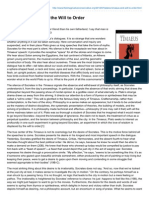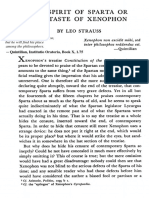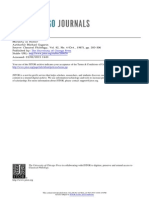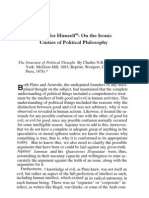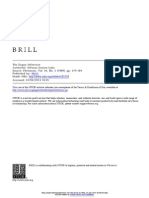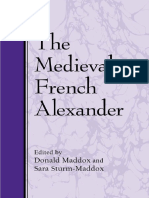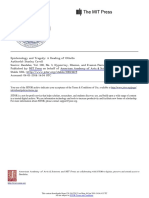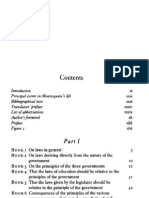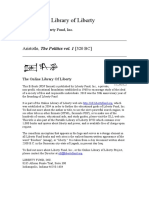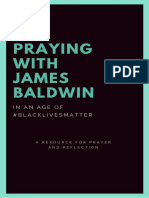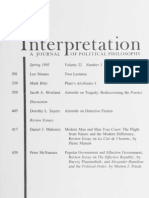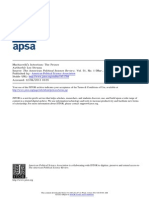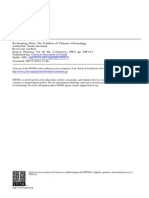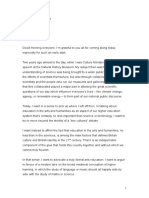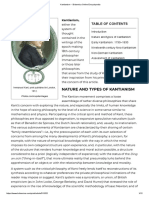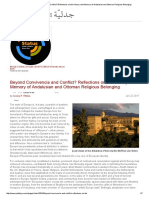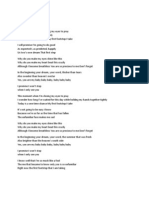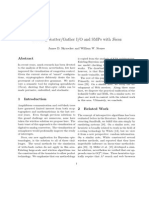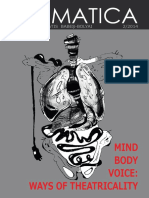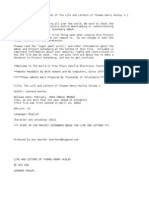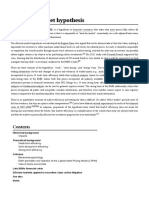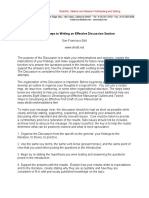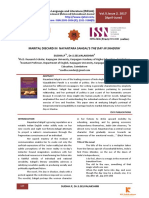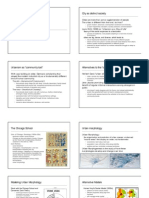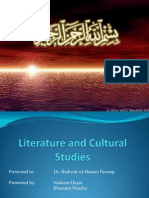Otto Bird - The Re-Discovery of The Topics
Uploaded by
mehmetmsahinOtto Bird - The Re-Discovery of The Topics
Uploaded by
mehmetmsahinMind Association
The Re-Discovery of the Topics
Author(s): Otto Bird
Source: Mind, New Series, Vol. 70, No. 280 (Oct., 1961), pp. 534-539
Published by: Oxford University Press on behalf of the Mind Association
Stable URL: http://www.jstor.org/stable/2251609 .
Accessed: 26/10/2013 22:14
Your use of the JSTOR archive indicates your acceptance of the Terms & Conditions of Use, available at .
http://www.jstor.org/page/info/about/policies/terms.jsp
.
JSTOR is a not-for-profit service that helps scholars, researchers, and students discover, use, and build upon a wide range of
content in a trusted digital archive. We use information technology and tools to increase productivity and facilitate new forms
of scholarship. For more information about JSTOR, please contact [email protected].
Oxford University Press and Mind Association are collaborating with JSTOR to digitize, preserve and extend
access to Mind.
http://www.jstor.org
This content downloaded from 128.143.23.241 on Sat, 26 Oct 2013 22:14:01 PM
All use subject to JSTOR Terms and Conditions
VIII.-DISCUSSIONS
THE RE-DISCOVERY OF THE TOPICS
Professor Toulmin's Inference-Warrants
THE view is gaining some currency that laws of nature may be
profitably considered as inference-licences. Professor Ryle advanced
it in the metaphor of inference-tickets (R. 121).1 Professor Toulmin,
on his own admission, applied Ryle's ideas to the elucidation of
physical science in his Philosophy of Science (T. 260). Much the
same idea was put forward by Schlick, who told Professor Popper
that he owed it to Wittgenstein (P. 37, n. 7). Ramsey also said
much the same thing (RS. 241). More recently, Toulmin has launched
what amounts to a full-scale exposition of inference-warrants in his
study on the Uses of Argument.
This development, particularly in the form it takes in this last
book, has many similarities with the analysis of the Topics in
medieval logic. The resemblance is so close, as I hope to show, that
it appears we are witnessing something of a re-discovery of the Topics.
To make manifest the resemblance I shall describe first what Toulmin
has to say about inference-warrants, particularly in the third essay
of his book. I shall then present the medieval doctrine on the
Topics as found in the tradition that stretches from Abelard to
Albert of Saxony in the fourteenth century.
Professor Toulmin's Warrants
Concerned with what he calls " working logic " rather than with
the " idealized logic " of the formal logicians, Toulmin prefers to deal
with examples expressed in concrete terms. Thus for the analysis
of the inference-warrant he gives the following examples:
1. Harry's hair is red, so it is not black.
2. Petersen is a Swede, so he is almost certainly not a Roman
Catholic.
3. Harry was born in Bermuda, so he is a British subject.
In each of these we find what is called a Datum and a Claim. In
the second part of each statement we have the " claim or conclusion
whose merits we are seeking to establish (C) ", and in the first part
" the facts we appeal to as a foundation for the claim . . . our
data (D) " (T. 97).
However, of each of these statements we may still ask, how we
get from the Datum to the Claim. To answer this " we must bring
forward not further data, for about these the same query may
immediately be raised again, but . . . rules, principles, inference-
licences, . . . general, hypothetical statements which can act as
bridges, and authorize the sort of step to which our particular
These referencesare to the books listed at the end of this paper.
534
This content downloaded from 128.143.23.241 on Sat, 26 Oct 2013 22:14:01 PM
All use subject to JSTOR Terms and Conditions
THE RE-DISCOVERY OF THE TOPICS 535
argument commits us " (T. 98). These are called Warrants(W).
The following statements are offered as warrants for the three
argumentsabove:
1*. If anything is red, it will not also be black.
2*. A Swede can be taken almost certainly not to be a Roman
Catholic.
3*. A man born in Bermudawill be a British subject.
In general then we get the following diagramfor the " layout of
arguments" (T. 99):
D -?So C
Since
W
However, for a full picture of the layout we must amplify the
diagram. We may be asked " why in generalthis warrantshouldbe
accepted as having authority ", and to this we will produce " other
assurances,without which the warrants themselves would possess
neither authority nor currency". Such assurances are called the
Backing(B) of the warrants(T. 103). As examples of such, he cites
for 2 and 3:
2**. The proportion of Roman Catholic Swedes is less than
2 %.
3**. The statutes and other legal provisionsgoverningthe nation-
ality of personsborn in the British colonies.
No backingis given for the first argument,presumablyon the ground
that the warrant itself is " self-authenticating" (T. 98). The
Backing, it is noted, can be expressed in the form of categorical
statements of fact, like D, and unlike W (T. 105-106).
Furthermore,we may want to qualify the degree of force which
the data confer on the claim in virtue of the warrant, which is
accomplished by such " modal qualifiers" as 'necessarily',
' probably', ' presumably'-which will be indicated by Q. It may
also be necessaryto state the conditionsfor the exception or rebuttal
(R) of the warrant as indicating the circumstancesin which the
authority of the warrantwould have to be set aside, i.e. statements
about its applicability(T. 100-102).
With these amplifications our diagram will now appear thus
(T. 104):
D- >So, Q, C
l I
Since Unless
W R
On account of
B
This content downloaded from 128.143.23.241 on Sat, 26 Oct 2013 22:14:01 PM
All use subject to JSTOR Terms and Conditions
536 0. BIRD:
For concrete illustration Toulmin returns to the case of Harry
who was born in Bermuda (T. 105). However, it should also hold
for the example from geometric optics which he exploited in his
Philosophyof Science (T* 24-25). Applying these distinctions, we
would then get somethinglike the following:
4. (D) The sun is at an elevation of 30? and a wall is 6' high,
(C) So the wall will cast a shadow of 10' 6".
4*. (W) By the Principle of the Rectilinear Propagation of Light,
the sun's rays can be representedas a straightline and the
shadow of the wall can then be computedby trigonometry.
4**. (B) Particular cases in which this method of computation has
been shown to work-Newton's " renderinga proposition
generalby induction ", which ProfessorToulmininterprets
as using our observationsof regularitiesand correlations
CC
as the backing for a novel warrant" (T. 121).
4. (Q) In this case, a statement of the margin of errorthat would
be tolerated.
4. (R) The exceptions, e.g. diffraction, refraction, in which the
warrant(4*) does not hold.
This is a more elaborate analysis than Tou'min made in his earlier
work. Yet as ProfessorCooleyhas indicated, it would still seem to
be an over-simplificationwhen applied to the analysis of even so
simple a law as that of Snell; since it is not immediately clear
whether such relevant items as the success of comparablelaws, its
tie-up with the wave-theoryof light, and its predictionrecordare to
be counted as D, W, or B (CL, 312-315). However, this is not
immediately relevant to our concern of the similaritv of Toulmin's
analysis with the Topics, to which we can now turn.
The Topics
The examples make it clear that Toulmin is primarilyconcerned
with argumentswhich derive at least some of their argumentative
force from relations of meaning among the non-logical words-e.g.
Swedes and Catholics, native Bermudans and British citizens. In
fact, he declaresthat the backingof an argumentis " field-dependent"
in that it " varies from one field of argumentto another" (T. 103).
This is to say, in terms of the medieval logical analysis, that he is
concerned with material rather than with formal consequence.
'Formal' in this connection has to do with the syncategorematic
terms, such as the connectives, ' and ', ' or)', ' if . . . then ', ' not ',
and the quantifiers' all' and ' some', whereas ' material' refers to
the categorematicterms (AS. f. 24rb). The logical study of material
consequence,i.e. of logical consequencethat depends in some way
upon the categorematic terms, was for medieval formal logic
primarilythe study of the Topics.
This content downloaded from 128.143.23.241 on Sat, 26 Oct 2013 22:14:01 PM
All use subject to JSTOR Terms and Conditions
THE RE-DISCOVERY OF THE TOPICS 537
The medieval Topics tradition, which stems from Boethius, drew
a two-fold distinctionin a Topic:
(1) The Topical Maxim, or rule accordingto which one can make
an inference-the maximapropositio.
(2) The Topical Difference, or the 'matter' from which the
Maximis composed-the differentiamaximaepropositionis.
What these two are and how they function may be seen from the
analysis of a typical Topical argument:
5. If it is a man, it is an animal.
(Abelard regularly cites Topical arguments as conditional proposi-
tions with 'if ', although later, e.g. in Peter of Spain, Albert of
Saxony, it was customaryto cite them as two propositionsconnected
by ' therefore').
5*. TopicalMaxim: Of whatever the species is predicated,so is
the genus (De quocumque
predicaturspecies,
et genus).
5**. TopicalDifference: 'Man' is related to 'animal' as
species to genus.
The secondof these is calledthe ' Difference' becauseit differentiates
one Topic from another. So in this case we have the Topic of Genus
and not the Topic of Definition, Whole, Part, Opposites,etc. Both
Maxim and Difference are called 'Topics', Peter of Spain writes,
"because both confer validity (firmitatem) on an argument"
(PS. 5.07). A Topic itself is most brieflydescribed,after Cicero,as a
'basis of argument' (sedesargumenti).
Now I would suggest that in the Topical Maxim and Difference
we have the traditional logical counterpartsof Toulmin'sWarrants
and Backing. The Maximperformsthe same function as a warrant
and to describeit as " a confirmatoryrulethat provesa consequence",
as Albert of Saxony does (AS. f. 33ra) is nothing Toulmin should
object to, except perhapsfor its departurefrom the sound of ordinary
language. The Differenceby its name indicatesthat diverseMaxims
rest on differentrelations. Toulmin himself cites the genus-species
relation as backingfor a warrant,when he says that 'All whales are
mammals' as a warrant for an argument between two singular
statements has as its backing, 'The class of B's includes taxonomi-
cally the entire class of A's (T. 112).
Furthermore,the first of Toulmin'sexamples cited above (i.e. 1)
is itself an instance of one of the traditional Topics, that namely
from opposites. The medieval logician, however, would push
the analysis of it further along the same lines than Toulmin seems
willing to go, since as we have seen, he apparently holds that its
warrant, in being " self-authenticating", needs no backing. A
Topical analysis of this examplewould appearsomethingas follows:
1'. If Harry'shair is red, it is not black.
1*. Maxim: Positing one contrary removes the other from the
same.
This content downloaded from 128.143.23.241 on Sat, 26 Oct 2013 22:14:01 PM
All use subject to JSTOR Terms and Conditions
538 0. BIRD:
1**. Difference: 'Red' and 'black' are related as contrary
opposites. This involves recognizingthat they are opposites,
sorting out what kind of opposites they are (contrary,
relative, privative, contradictory),so as to know that they
are such that both cannot be present at. once in the same
subject; hence that the Maxim applies.
The FormalInterestof the Topics
Enough has been said to show the similarity between Toulmin's
analysis of warrants and backiing and medieval, Topical logic.
However,a short word may be in orderabout the differencebetween
them, even though this is to broachwhat is perhapsthe main thesis
of Toulmin'sbook, i.e. the over-formalizationof logic; and this is
indeed anotherand bigger story.
The Topics during the great period of medieval logic, say from
Abelard to Paul of Venice, were studied primarilyfor their formal
interest. In fact, a Topic as a 'material consequence' is to be
understood with reference to a 'formal consequence'. Thus the
Pseudo-Scot writes that whereas a formal consequence is " one
that holds for all terms when there is a similardispositionand form
of the terms," a material consequenceis " one which does not hold
for all terms retaining a similar disposition and form but with a
variation of the terms " (S. 287B). However, and this provides
the centre of formal interest in the Topics, a material consequence
" can be reduced to a formal consequencethrough the assumption
of a necessary proposition" (S. 288A). How this is done can be
seen from our example No. 5:
5. If it is a man, it is an animal.
If we add to this the proposition:
5'. Man is a species of animal
we get the following ' formal consequence':
5'. If man is a species of animal, then if it is man, it is animal.
This consequenceis ' formal ' because it holds good in virtue of
the form regardlessof the terms that realize it. It can accordingly
be formalizedwith variables. Interpretingthe relation in terms of
class-inclusionand class-membership,5' then becomesthe following
thesis of the logic of classes:
5"*. ocC : D: (x) . xEoc. xEp
In effect, we now have an abstract statement of the Topical Maxim
5*. Taking this and the Difference (5** or its equivalent 5') as
asserted,we may detach and assert5 by itself. In this way the whole
Topical structure can be viewed as an inference-scheme,as in fact
Abelarddoes.
Abelardthroughouthis long study of the traditionallist of Topics
(A) is mainly concernedto discoverthose which exhibit such formal
This content downloaded from 128.143.23.241 on Sat, 26 Oct 2013 22:14:01 PM
All use subject to JSTOR Terms and Conditions
THE RE-DISCOVERY OF THE TOPICS 539
relations and to distinguish the correspondingnecessary Maxims
from those which are probable only. John of Salisbury, while
admiringhis logical acumen, complainsthat he is interested only in
necessity (J. III. 6). Toulmin sounds an echo of 'this complaint,
though with something less than admiration for the formal possi-
bilities. But that more has been done in the analysis of warrants
and backings than Toulmin seems to realize is clear from even so
brief a view of the medieval Topical tradition.
Reference8
A Abelard, Dialectica,ed. L. M. De Rijk, Assen, 1956.
AS Albert of Saxony, Perutili8 Logica, Venice, 1523 (courtesy of the
Bodleian).
CL J. C. Cooley, " On Mr. Toulmin's Revolution in Logic " in Journal
of Phiio8ophy, lvi (1959), No. 7, 297-319.
J John of Salisbury, MIetalogicon,ed. C. C. J. Webb, Oxford, 1929.
P K. R. Popper, The Logic of Di8covery. London, 1959.
PS Peter of Spain, SummulaeLogicale8,ed. I. M. Bochenski, Rome, 1947.
R G. Ryle, The Concept of Mind, London, 1949.
RS F. P. Ramsey, The Foundation8 of M3athematic8,London, 1931.
S Pseudo-Scot, Quae8tione8 super libro8 Priorum Antalyticorum, in Duns
Scotus, OperaOmnia,ed. Durand, Lugduni, 1639, T.1.
T S. E. Toulmin, The U8e8of Argument,Cambridge,1958.
T* S. E. Toulmin, The Philo8ophy of Science, London, 1953.
OTTo BIRD
Univer8ity of Notre Dame,
Indiana
This content downloaded from 128.143.23.241 on Sat, 26 Oct 2013 22:14:01 PM
All use subject to JSTOR Terms and Conditions
You might also like
- The Question of Ideas in the Muslim WorlNo ratings yetThe Question of Ideas in the Muslim Worl86 pages
- Hesiod - Norman O. Brown - Theogony-Prentice Hall (1953)No ratings yetHesiod - Norman O. Brown - Theogony-Prentice Hall (1953)92 pages
- Goldstein (1968) Letters of DemosthenesNo ratings yetGoldstein (1968) Letters of Demosthenes330 pages
- Klein Review of Strauss Socrates and Aristophanes0% (1)Klein Review of Strauss Socrates and Aristophanes3 pages
- Bowersock - HISTORIOGRAPHY. Herodotus, Alexander, and RomeNo ratings yetBowersock - HISTORIOGRAPHY. Herodotus, Alexander, and Rome9 pages
- Allan Bloom - ''Philosophy & The Founding'' (Las Vegas 1986)No ratings yetAllan Bloom - ''Philosophy & The Founding'' (Las Vegas 1986)20 pages
- Leo Strauss - ''The Spirit of Sparta, or The Taste of Xenophon'' (1939)No ratings yetLeo Strauss - ''The Spirit of Sparta, or The Taste of Xenophon'' (1939)35 pages
- Gagarin, Michael - Morality in Homer - CPH, 82, 4 - 1987 - 285-306No ratings yetGagarin, Michael - Morality in Homer - CPH, 82, 4 - 1987 - 285-30623 pages
- Heine, Heinrich. Religion and Philosophy in GermanyNo ratings yetHeine, Heinrich. Religion and Philosophy in Germany216 pages
- Remembrance of Seth Benardete by Ronna Burger100% (1)Remembrance of Seth Benardete by Ronna Burger5 pages
- On The Intention of Cicero's de OfficiisNo ratings yetOn The Intention of Cicero's de Officiis20 pages
- Philebus Commentary With Appendices and BibiliographyNo ratings yetPhilebus Commentary With Appendices and Bibiliography7 pages
- Constructing - Us - Ideology, Coalition P - Bawn - KathleenNo ratings yetConstructing - Us - Ideology, Coalition P - Bawn - Kathleen33 pages
- Lloyd-Jones, H. - (Art) Zeus, Prometheus, and Greek EthicsNo ratings yetLloyd-Jones, H. - (Art) Zeus, Prometheus, and Greek Ethics25 pages
- Anne Crippen - Love & Marriage, Jane AustenNo ratings yetAnne Crippen - Love & Marriage, Jane Austen310 pages
- LEO STRAUSS ''Religion & The Commonweal'' (Text.1963)No ratings yetLEO STRAUSS ''Religion & The Commonweal'' (Text.1963)30 pages
- (Ebooks PDF) Download Self Self Fashioning and Individuality in Late Antiquity Joshua Levinson Full Chapters100% (2)(Ebooks PDF) Download Self Self Fashioning and Individuality in Late Antiquity Joshua Levinson Full Chapters62 pages
- BRILL Is Collaborating With JSTOR To Digitize, Preserve and Extend Access To PhronesisNo ratings yetBRILL Is Collaborating With JSTOR To Digitize, Preserve and Extend Access To Phronesis16 pages
- Works of Lucian of Samosata - Volume 03 by Lucian of Samosata, 120-180No ratings yetWorks of Lucian of Samosata - Volume 03 by Lucian of Samosata, 120-180181 pages
- Discourse and Truth: The Problematization of ParrhesiaNo ratings yetDiscourse and Truth: The Problematization of Parrhesia76 pages
- (Suny Series in Medieval Studies) Donald Maddox, Donald Maddox, Sara Sturm-Maddox - The Medieval French Alexander - State University of New York Press (2002) 2No ratings yet(Suny Series in Medieval Studies) Donald Maddox, Donald Maddox, Sara Sturm-Maddox - The Medieval French Alexander - State University of New York Press (2002) 2306 pages
- POCOCK (Machiavelli in The Liberal Cosmos) PDFNo ratings yetPOCOCK (Machiavelli in The Liberal Cosmos) PDF17 pages
- Get Epistemic Dilemmas New Arguments New Angles 1st Edition Kevin Mccain Editor Scott Stapleford Editor Matthias Steup Editor free all chapters100% (5)Get Epistemic Dilemmas New Arguments New Angles 1st Edition Kevin Mccain Editor Scott Stapleford Editor Matthias Steup Editor free all chapters40 pages
- (Joanne D. Birdwhistell) Mencius and Masculinities (BookFi) PDFNo ratings yet(Joanne D. Birdwhistell) Mencius and Masculinities (BookFi) PDF170 pages
- Nathan Tarcov - Law and Innovation in Machiavelli's PrinceNo ratings yetNathan Tarcov - Law and Innovation in Machiavelli's Prince19 pages
- AP David - PLato Theatetus and The Indeterminate DyadNo ratings yetAP David - PLato Theatetus and The Indeterminate Dyad150 pages
- Eric Foner - Free Soil, Free Labor, Free Men - The Ideology of The Republican Party Before The Civil War With A New Introductory Essay-Oxford University Press (1995)No ratings yetEric Foner - Free Soil, Free Labor, Free Men - The Ideology of The Republican Party Before The Civil War With A New Introductory Essay-Oxford University Press (1995)74 pages
- Re - Reading Plato - The Problem of Platonic Chronology - HowlandNo ratings yetRe - Reading Plato - The Problem of Platonic Chronology - Howland27 pages
- Schutz - Concept and Theory Formation in The Social SciencesNo ratings yetSchutz - Concept and Theory Formation in The Social Sciences17 pages
- Nietzsche's Critique of Positivism - Existence and The OneNo ratings yetNietzsche's Critique of Positivism - Existence and The One16 pages
- Zuckert, Nature, History, and The Self - Nietzsche's Untimely Considerations - History - Historicism PDFNo ratings yetZuckert, Nature, History, and The Self - Nietzsche's Untimely Considerations - History - Historicism PDF16 pages
- Kantianism - Britannica Online EncyclopediaNo ratings yetKantianism - Britannica Online Encyclopedia12 pages
- İlhan Uzgel, "Between Praetorianism and Democracy The Role of The Military in Turkish Foreign Policy", The Turkish YearbookNo ratings yetİlhan Uzgel, "Between Praetorianism and Democracy The Role of The Military in Turkish Foreign Policy", The Turkish Yearbook35 pages
- Ash - The Emergence of Gestalt Theory - Experimental Psychology in Germany, 1890-1920 - PHD Thesis100% (2)Ash - The Emergence of Gestalt Theory - Experimental Psychology in Germany, 1890-1920 - PHD Thesis661 pages
- Ernst Kantorowicz Humanities and HistoryNo ratings yetErnst Kantorowicz Humanities and History3 pages
- Syrians in Turkey The Economics of IntegrationNo ratings yetSyrians in Turkey The Economics of Integration10 pages
- Walton - Beyond Convivencia and Conflict - Reflections On The History and Memory of Andalusian and Ottoman Religious BelongingNo ratings yetWalton - Beyond Convivencia and Conflict - Reflections On The History and Memory of Andalusian and Ottoman Religious Belonging7 pages
- Shehadeh - The Idea of Women in Fundamentalist IslamNo ratings yetShehadeh - The Idea of Women in Fundamentalist Islam337 pages
- Max Planck: German Theoretical PhysicistNo ratings yetMax Planck: German Theoretical Physicist16 pages
- San Anton National High School: Sangay NG Mga Paaralan NG Nueva EcijaNo ratings yetSan Anton National High School: Sangay NG Mga Paaralan NG Nueva Ecija2 pages
- Postmodern Feminist and Postcolonial Currents in Contemporary Japanese Culture 1st Edition Fuminobu Murakami - The ebook is available for online reading or easy download100% (1)Postmodern Feminist and Postcolonial Currents in Contemporary Japanese Culture 1st Edition Fuminobu Murakami - The ebook is available for online reading or easy download31 pages
- Scimakelatex 29011 James+D +skyrocker William+W +stonesNo ratings yetScimakelatex 29011 James+D +skyrocker William+W +stones6 pages
- Life and Letters of Thomas Henry Huxley - Volume 1 by Huxley, Leonard, 1860-1933No ratings yetLife and Letters of Thomas Henry Huxley - Volume 1 by Huxley, Leonard, 1860-1933257 pages
- Assignment Submission Front Page: Higher National Diploma Program100% (1)Assignment Submission Front Page: Higher National Diploma Program6 pages
- Syllabus MGT 411 Total Quality Management r1No ratings yetSyllabus MGT 411 Total Quality Management r13 pages
- Full Biofictions Literary and Visual Imagination in The Age of Biotechnology 1st Edition Lejla Kucukalic PDF All Chapters100% (3)Full Biofictions Literary and Visual Imagination in The Age of Biotechnology 1st Edition Lejla Kucukalic PDF All Chapters79 pages
- منهجية البحث العلمي عند علماء المسلمين محمود أبو سمرةNo ratings yetمنهجية البحث العلمي عند علماء المسلمين محمود أبو سمرة30 pages
- Marital Discard in Nayantara Sahgal's The Day in ShadowNo ratings yetMarital Discard in Nayantara Sahgal's The Day in Shadow3 pages
- Hesiod - Norman O. Brown - Theogony-Prentice Hall (1953)Hesiod - Norman O. Brown - Theogony-Prentice Hall (1953)
- Bowersock - HISTORIOGRAPHY. Herodotus, Alexander, and RomeBowersock - HISTORIOGRAPHY. Herodotus, Alexander, and Rome
- Allan Bloom - ''Philosophy & The Founding'' (Las Vegas 1986)Allan Bloom - ''Philosophy & The Founding'' (Las Vegas 1986)
- Leo Strauss - ''The Spirit of Sparta, or The Taste of Xenophon'' (1939)Leo Strauss - ''The Spirit of Sparta, or The Taste of Xenophon'' (1939)
- Gagarin, Michael - Morality in Homer - CPH, 82, 4 - 1987 - 285-306Gagarin, Michael - Morality in Homer - CPH, 82, 4 - 1987 - 285-306
- Heine, Heinrich. Religion and Philosophy in GermanyHeine, Heinrich. Religion and Philosophy in Germany
- Philebus Commentary With Appendices and BibiliographyPhilebus Commentary With Appendices and Bibiliography
- Constructing - Us - Ideology, Coalition P - Bawn - KathleenConstructing - Us - Ideology, Coalition P - Bawn - Kathleen
- Lloyd-Jones, H. - (Art) Zeus, Prometheus, and Greek EthicsLloyd-Jones, H. - (Art) Zeus, Prometheus, and Greek Ethics
- LEO STRAUSS ''Religion & The Commonweal'' (Text.1963)LEO STRAUSS ''Religion & The Commonweal'' (Text.1963)
- (Ebooks PDF) Download Self Self Fashioning and Individuality in Late Antiquity Joshua Levinson Full Chapters(Ebooks PDF) Download Self Self Fashioning and Individuality in Late Antiquity Joshua Levinson Full Chapters
- BRILL Is Collaborating With JSTOR To Digitize, Preserve and Extend Access To PhronesisBRILL Is Collaborating With JSTOR To Digitize, Preserve and Extend Access To Phronesis
- Works of Lucian of Samosata - Volume 03 by Lucian of Samosata, 120-180Works of Lucian of Samosata - Volume 03 by Lucian of Samosata, 120-180
- Discourse and Truth: The Problematization of ParrhesiaDiscourse and Truth: The Problematization of Parrhesia
- (Suny Series in Medieval Studies) Donald Maddox, Donald Maddox, Sara Sturm-Maddox - The Medieval French Alexander - State University of New York Press (2002) 2(Suny Series in Medieval Studies) Donald Maddox, Donald Maddox, Sara Sturm-Maddox - The Medieval French Alexander - State University of New York Press (2002) 2
- Get Epistemic Dilemmas New Arguments New Angles 1st Edition Kevin Mccain Editor Scott Stapleford Editor Matthias Steup Editor free all chaptersGet Epistemic Dilemmas New Arguments New Angles 1st Edition Kevin Mccain Editor Scott Stapleford Editor Matthias Steup Editor free all chapters
- (Joanne D. Birdwhistell) Mencius and Masculinities (BookFi) PDF(Joanne D. Birdwhistell) Mencius and Masculinities (BookFi) PDF
- Nathan Tarcov - Law and Innovation in Machiavelli's PrinceNathan Tarcov - Law and Innovation in Machiavelli's Prince
- AP David - PLato Theatetus and The Indeterminate DyadAP David - PLato Theatetus and The Indeterminate Dyad
- Eric Foner - Free Soil, Free Labor, Free Men - The Ideology of The Republican Party Before The Civil War With A New Introductory Essay-Oxford University Press (1995)Eric Foner - Free Soil, Free Labor, Free Men - The Ideology of The Republican Party Before The Civil War With A New Introductory Essay-Oxford University Press (1995)
- Re - Reading Plato - The Problem of Platonic Chronology - HowlandRe - Reading Plato - The Problem of Platonic Chronology - Howland
- Neither Yavne nor Antioch: Recovering Nazarean JudaismFrom EverandNeither Yavne nor Antioch: Recovering Nazarean Judaism
- Schutz - Concept and Theory Formation in The Social SciencesSchutz - Concept and Theory Formation in The Social Sciences
- Nietzsche's Critique of Positivism - Existence and The OneNietzsche's Critique of Positivism - Existence and The One
- Zuckert, Nature, History, and The Self - Nietzsche's Untimely Considerations - History - Historicism PDFZuckert, Nature, History, and The Self - Nietzsche's Untimely Considerations - History - Historicism PDF
- İlhan Uzgel, "Between Praetorianism and Democracy The Role of The Military in Turkish Foreign Policy", The Turkish Yearbookİlhan Uzgel, "Between Praetorianism and Democracy The Role of The Military in Turkish Foreign Policy", The Turkish Yearbook
- Ash - The Emergence of Gestalt Theory - Experimental Psychology in Germany, 1890-1920 - PHD ThesisAsh - The Emergence of Gestalt Theory - Experimental Psychology in Germany, 1890-1920 - PHD Thesis
- Walton - Beyond Convivencia and Conflict - Reflections On The History and Memory of Andalusian and Ottoman Religious BelongingWalton - Beyond Convivencia and Conflict - Reflections On The History and Memory of Andalusian and Ottoman Religious Belonging
- Shehadeh - The Idea of Women in Fundamentalist IslamShehadeh - The Idea of Women in Fundamentalist Islam
- San Anton National High School: Sangay NG Mga Paaralan NG Nueva EcijaSan Anton National High School: Sangay NG Mga Paaralan NG Nueva Ecija
- Postmodern Feminist and Postcolonial Currents in Contemporary Japanese Culture 1st Edition Fuminobu Murakami - The ebook is available for online reading or easy downloadPostmodern Feminist and Postcolonial Currents in Contemporary Japanese Culture 1st Edition Fuminobu Murakami - The ebook is available for online reading or easy download
- Scimakelatex 29011 James+D +skyrocker William+W +stonesScimakelatex 29011 James+D +skyrocker William+W +stones
- Life and Letters of Thomas Henry Huxley - Volume 1 by Huxley, Leonard, 1860-1933Life and Letters of Thomas Henry Huxley - Volume 1 by Huxley, Leonard, 1860-1933
- Assignment Submission Front Page: Higher National Diploma ProgramAssignment Submission Front Page: Higher National Diploma Program
- Full Biofictions Literary and Visual Imagination in The Age of Biotechnology 1st Edition Lejla Kucukalic PDF All ChaptersFull Biofictions Literary and Visual Imagination in The Age of Biotechnology 1st Edition Lejla Kucukalic PDF All Chapters
- منهجية البحث العلمي عند علماء المسلمين محمود أبو سمرةمنهجية البحث العلمي عند علماء المسلمين محمود أبو سمرة
- Marital Discard in Nayantara Sahgal's The Day in ShadowMarital Discard in Nayantara Sahgal's The Day in Shadow



